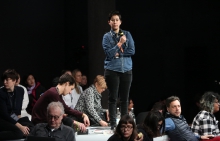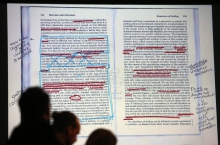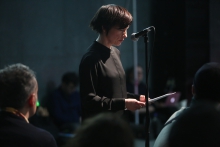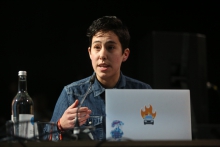Study Circle: Affective Infrastructures
Study Circle: Affective Infrastructures
What remains for our pedagogy of unlearning is to build affective infrastructures that admit the work of desire as the work of an aspirational ambivalence. What remains is the potential we have to common infrastructures that absorb the blows of our agressive need for the world to accommodate us [...]. — Lauren Berlant, The Commons: Infrastructures for Troubling Times
Affective Infrastructures revisits the understanding of the notion of infrastructures and its relation to affect. It is one of two newly introduced Study Circles that frame the 2019 edition of transmediale and are part of the core program of the festival days. In response to the festival theme, the Study Circles bring together artists, researchers, and activists in working groups taking place before, during, and after transmediale 2019 in order to strengthen the festival as a site of knowledge exchange by involving participants at an early stage. The Study Circles take place in association with TIER.space, Spektrum, and Import Projects. Before transmediale 2019, the Berlin-based project spaces host a series of working meetings and, parallel to the festival, present their own program on the themes of the Study Circles.
Looking into the ways that contemporary technologies capture emotions and control bodies, Affective Infrastructures examines how they mediate and regulate life. It emphasizes how systems based on machine reading or face and voice recognition can police behaviors, classify habits, and influence collective feeling. Acknowledging affect itself as a powerful infrastructure, the members of the Study Circle ask: How can we move towards technologies that would accommodate multiplicity and difference? In which ways can categories that predefine experiences and lives be complexified? How can the lived experiences of material and affective infrastructures be used to mobilize bodies, energize politics, and bring about change? Which modes of learning and doing can empower new forms of worldbuilding?
Following Lauren Berlant’s approach that habits, norms, patterns, and affective assemblages are what bind us to each other and to the world itself, the Study Circle (re)turns to these elements as part of its exploration. By sharing knowledge, reflections, and practices, the participants discuss infrastructures with regard to lived experience: these include examples such as feminist servers, online #MeToo lists, the commons, cruising for sex and foraging for mushrooms as manifestations of binding moments and points of contact.
As a response to the problematics of care and empathy—and the forms of power and privilege that they involve—the potential of spaces that lie between autonomy and interdependency, non-sovereignty and agency, taxonomy and messiness are in the foreground of this discussion. Aiming to think and move beyond hegemonic systems, this Study Circle instead attends to hesitant, delirious, and imaginative living infrastructures (and technologies) that can embrace affective differences, multiple temporalities, and meaningful complexities.




